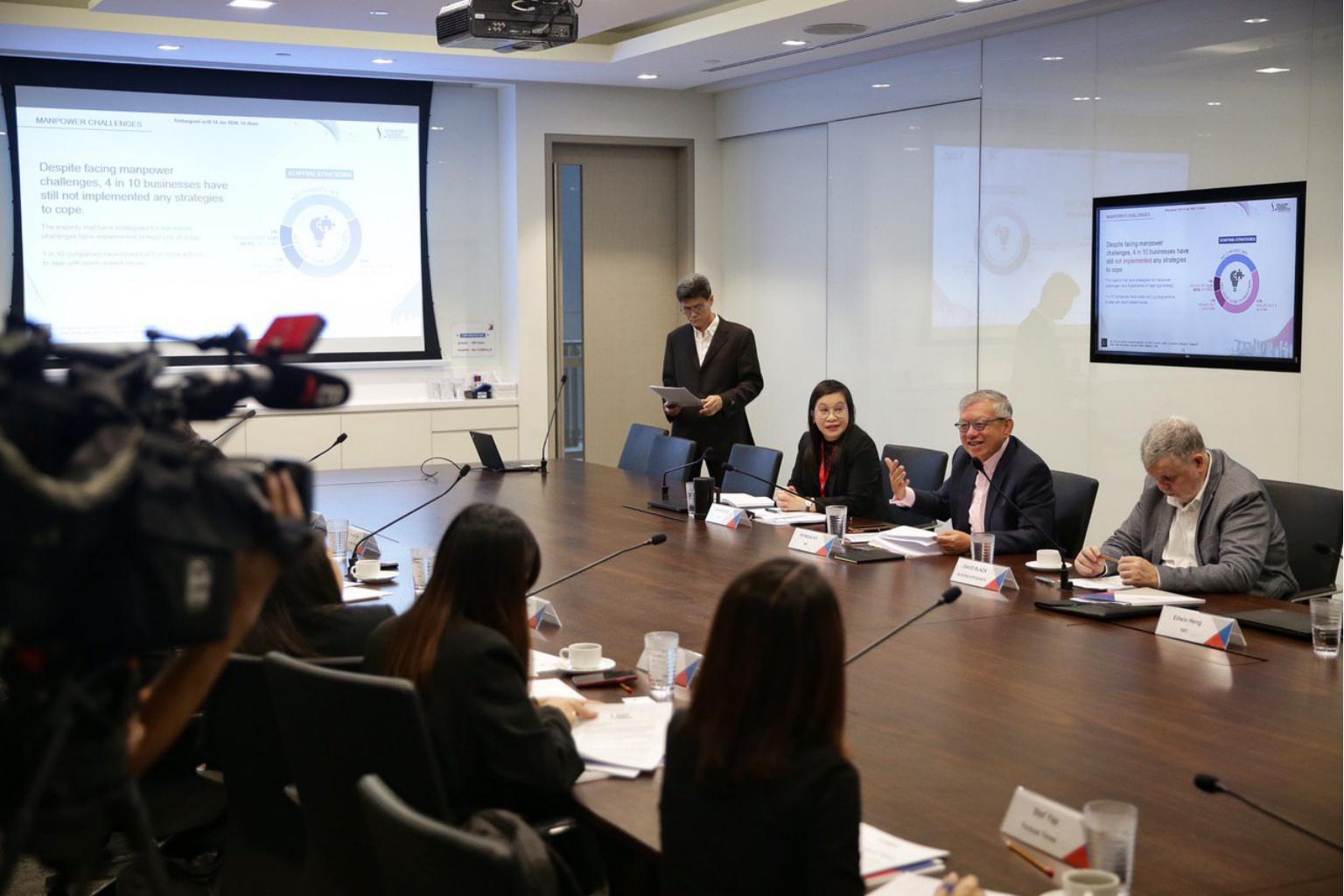Budget wish list: Firms seek tax cuts, rebates
They also want help in areas such as easier access to govt info and training incentives: Survey
Sign up now: Get ST's newsletters delivered to your inbox

(Left to right) Mr Edwin Heng, Director, Research & Publishing, Singapore Business Federation; Ms Joanne Guo, Assistant CEO, Strategy & Development, Singapore Business Federation; Mr Ho Meng Kit, CEO, Singapore Business Federation; and Mr David Black, Managing Director, Blackbox Research; at the National Business Survey 2019/2020 media conference on 14 Jan, 2020.
ST PHOTO: KEVIN LIM
Ovais Subhani Senior Correspondent, Ovais Subhani
Follow topic:
Tax relief is high on company wish lists for next month's Budget, given concerns about a tough year ahead, a survey noted yesterday.
It found that 55 per cent of both large firms and small and medium-sized enterprises (SMEs) rank corporate and income tax rate reduction and rebates to help upskill staff as the top two Budget priorities.
Nearly half of the respondents also want help in other areas, such as easier access to government information and resources (49 per cent), incentives for industry-related training (47 per cent) and corporate venturing (47 per cent).
The annual survey undertaken by the Singapore Business Federation (SBF) from Aug 26 to Oct 25 drew responses from around 1,000 firms.
Companies are seeking relief after a year wrought by economic uncertainties, partly because of the United States-China trade dispute.
The poll noted that 51 per cent of respondents felt that Singapore's business climate had worsened over the past 12 months. They were also less satisfied with the regional and global business environment compared with 2018.
For the year ahead, 44 per cent expect similar conditions, while 49 per cent anticipate the business climate here will get more challenging.
Worries over the global economic climate have also increased.
Other key concerns for this year include rising business costs, such as for rental and raw materials, increasing wages, the uncertainties created by US-China trade tensions and China's economic slowdown.
The three top challenges for local businesses for this year were identified as manpower costs (67 per cent), business competition (62 per cent) and finding new or better ways to grow revenue (56 per cent).
Manpower issues continue to frustrate local companies, the SBF noted yesterday.
The survey showed that while many firms struggle with rising labour costs, the dynamics stemming from tighter government policies on hiring foreigners and the competition to secure the best local talent are putting real pressure on many companies.
It also found that 40 per cent of firms said they face challenges in attracting or retaining younger workers.
SBF chief executive Ho Meng Kit said the Government should consider the wishes and issues of the business community in the survey as "feedback from the ground".
"But in my personal opinion, it is not reasonable to expect the Government to cut corporate taxes or give rebates," he added.
Mr Ho said he believed that the Government will spend the surplus on more targeted schemes and will keep its focus on the long-term goal of business transformation.
The survey showed that 90 per cent of businesses now recognise the importance of industry transformation to maintain competitiveness and competency.
Around 60 per cent of firms also see technology adoption as fundamental in transforming their businesses.
Despite the economic uncertainty, Singapore businesses continue to expand abroad with 80 per cent now having an overseas presence.
-
ST's Budget coverage
Get real-time updates and watch livestreaming on straitstimes.com on Feb 18.
Follow the proceedings on our Facebook and Twitter accounts.
Receive a special-edition Budget newsletter. To get the newsletter, sign up for ST Evening Update here.
Follow the proceedings on our Facebook and Twitter accounts.
Receive a special-edition Budget newsletter. To get the newsletter, sign up for ST Evening Update here.
Internationalisation has picked up pace, particularly among SMEs (78 per cent versus 68 per cent in 2018). In comparison, 93 per cent of large companies said they have expanded overseas.
SBF chairman Teo Siong Seng said it is critical for Singapore companies to expand overseas to access new markets, diversify their supply chains and to support sustainable growth, given the limitations of Singapore's small domestic market.
"It is encouraging that our SMEs are extending their global footprints more aggressively despite the economic uncertainty that shrouded 2019," he added.

